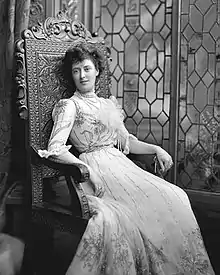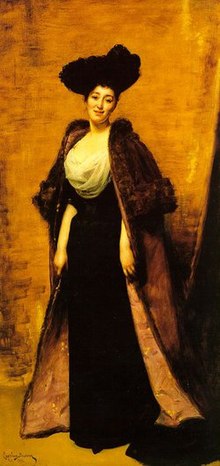Margaret Greville
Dame Margaret Helen Greville, DBE (née Anderson; 20 December 1863 – 15 September 1942), was a British society hostess and philanthropist. She was the wife of the Hon. Ronald Greville (1864–1908).
Margaret Greville | |
|---|---|
 Greville photographed in 1900. Courtesy of the Victoria & Albert Museum, London | |
| Born | Margaret Helen Anderson 20 December 1863 |
| Died | 15 September 1942 (aged 78) The Dorchester, London |
| Nationality | British |
| Occupation(s) | Society hostess and philanthropist |
| Spouse | The Hon. Ronald Greville |
Family background
Born Margaret Helen Anderson, she was the daughter of William McEwan (1827–1913), a brewery multimillionaire, later elected as an M.P. (Member of Parliament) for Edinburgh Central;[1][2] and his mistress, Helen Anderson (1835/1836–1906), a cook, who was married to William Anderson, a porter at McEwan's brewery in Edinburgh.[3] Following William Anderson's death in 1885, William McEwan married Helen later the same year, when Margaret was 21.
Life
In 1891, Margaret Anderson married the Hon. Ronald Greville (1864–1908). In 1906, her father purchased Polesden Lacey in Great Bookham, Surrey for her and her husband.[4] Her husband died two years later, and her father (who also lived at Polesden Lacey) in 1913. Margaret became known at Polesden Lacey as a society hostess; and was a close friend of Queen Mary. She received proposals of marriage from Sir Evelyn Ruggles-Brise and (in 1917) from Sir John Simon, but declined both.[3][5]
She was named a Dame Commander of the Order of the British Empire (DBE) in 1922.
Writing in 1933, Jean, wife of Sir Ian Hamilton wrote that at a dinner, Violet Bonham-Carter had 'a violent discussion' with Greville about how Hitler was threatening Jewish people.[6] In the 1934, Greville attended a Nuremberg Rally, and returned to England reportedly 'full of enthusiasm for Hitler'.[7]
Death and bequests
Greville and her husband had no children. She died in 1942, and is buried in the grounds of Polesden Lacey.
She bequeathed the house with its contents (described in an inventory completed in 1943) and estate at Polesden Lacey to the National Trust in memory of her father.[4] Among the various items, paintings and other works are generally referred to as the "McEwan bequest", and are listed on the Art UK website with the text "bequeathed with Polesden Lacey by Dame Margaret Greville, in memory of her father William McEwan, 1942".
She bequeathed all her jewels to Queen Elizabeth (later the Queen Mother), including a diamond necklace reputedly belonging to Marie Antoinette, a pair of diamond chandelier earrings[8] and selection of tiaras and a ruby necklace by Boucheron,[9] all of which remain in the possession of the British royal family. The jewellery was presented in a black tin box. To this day, the full extent of the collection is still not known.[10]
One notable item of jewellery is the honeycomb-patterned diamond tiara (often referred to as the "Greville Tiara") which was a favourite of the Queen Mother, and in recent years has been worn frequently by Queen Camilla.[11]

Another tiara, the Greville Emerald Kokoshnik tiara, was worn by Princess Eugenie at her wedding to Jack Brooksbank in October 2018.[12] The platinum and diamond tiara was made by Parisian jeweller Boucheron in 1919. It features a 93.70 carat cabochon cut emerald in the centre surrounded by a halo of rose cut diamonds and six smaller emeralds graduating either side of the large central emerald.[13]
Greville also left £20,000 to Princess Margaret, and £25,000 to Queen Victoria Eugenia of Spain.[14]
Reputation
Following Greville's death, Queen Elizabeth, who inherited the bulk of Greville's huge collection of jewellery, described her as "so shrewd, so kind and so amusingly unkind, so sharp, such fun, so naughty; altogether a real person, a character, utterly Mrs Ronald Greville".[15]
By contrast, Sir Cecil Beaton described her as "a galumphing, greedy, snobbish old toad who watered at her chops at the sight of royalty ... and did nothing for anybody except the rich".[16]
Rudyard Kipling is thought to have called her a slug.
James Lees-Milne, in his diaries, commented: "Everyone is agog to hear the terms of Mrs G's will. She was a lady who loved the great because they were great, and apparently had a tongue dipped in gall. I remember old Lady Leslie exclaiming, 'Maggie Greville! I would sooner have an open sewer in my drawing room!'"[17]
References
- "Dr. William McEwan: Overview of Dr. William McEwan". Scottish-places.info. Retrieved 29 March 2016.
- Donnachie, Ian (2004). "McEwan, William (1827–1913)". Oxford Dictionary of National Biography (online ed.). Oxford University Press. doi:10.1093/ref:odnb/50416. (Subscription or UK public library membership required.)
- Davenport-Hines 2015.
- "History of Polesden Lacey". National Trust. Retrieved 27 February 2010.
- Dutton, David (1992). Simon: a political biography of Sir John Simon. London: Aurum Press. pp. 325–26. ISBN 1854102044.
- Lee, Celia (14 December 2020). Jean, Lady Hamilton, 1861–1941: Diaries of A Soldier's Wife. Pen and Sword Military. p. 348. ISBN 978-1-5267-8661-6.
- Bouverie, Tim (18 April 2019). Appeasing Hitler: Chamberlain, Churchill and the Road to War. Random House. pp. vii. ISBN 978-1-4735-4775-9.
- "A Royal Wedding". Royal Collection. 20 November 1947. Retrieved 29 March 2016.
- "A Royal Wedding". Royal Collection. 24 October 1907. Retrieved 29 March 2016.
- "The mystery of Mrs Greville's jewellery". National Trust. Retrieved 1 October 2019.
- "Best Royal Family Jewelry of All Time". 10 October 2018.
- "The History Behind Princess Eugenie's Emerald and Diamond Wedding Day Tiara". Vogue. Retrieved 13 October 2018.
- Royce-Greensill, Sarah (12 October 2018). "Who was Margaret Greville, the socialite who originally owned Princess Eugenie's wedding tiara?". The Telegraph. ISSN 0307-1235. Retrieved 1 October 2019.
- Lees-Milne, James (1984) [1975]. Ancestral Voices. London: Faber. p. 122. ISBN 0571133258.
- Bradford, Sarah (1989). King George VI. London: Weidenfeld and Nicolson. p. 111. ISBN 9780297796671.
- Buckle, Richard, ed. (1979). Self-portrait with Friends: selected diaries of Cecil Beaton. London: Weidenfeld and Nicolson. pp. 215–16. ISBN 0297776584.
- Bloch, Michael, ed. (2006). Diaries: 1942-1954. London: John Murray. ISBN 0719566800.
Bibliography
- Davenport-Hines, Richard (2015) [2004]. "Greville [née Anderson], Dame Margaret Helen (1863–1942)". Oxford Dictionary of National Biography (online ed.). Oxford University Press. doi:10.1093/ref:odnb/51986. (Subscription or UK public library membership required.)
External links
- Royal Magazine
- ""Uncouth Australians"". Time Magazine. 9 May 1927. Archived from the original on 30 September 2007. Retrieved 10 August 2008.